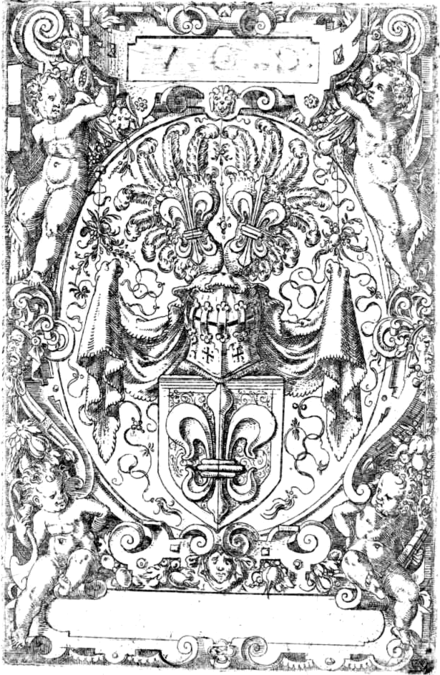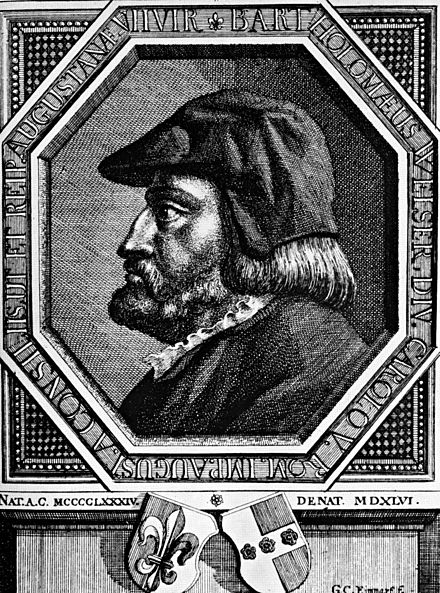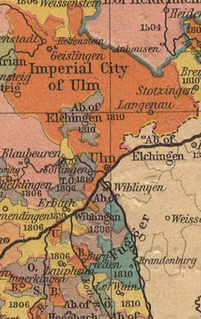
Fugger is a German upper bourgeois family that was historically a prominent group of European bankers, members of the fifteenth- and sixteenth-century mercantile patriciate of Augsburg, international mercantile bankers, and venture capitalists. Alongside the Welser family, the Fugger family controlled much of the European economy in the sixteenth century and accumulated enormous wealth. The Fuggers held a near monopoly on the European copper market.

The German colonization of the Americas consisted of German Venezuela, St. Thomas and Crab Island in the 16th and 17th centuries.

Ferdinand II, Archduke of Further Austria was ruler of Further Austria and since 1564 Imperial count of Tirol. The son of Ferdinand I, Holy Roman Emperor, he was married to Philippine Welser in his first marriage. In his second marriage to Anna Juliana Gonzaga, he was the father of Anna of Tyrol, future Holy Roman Empress.
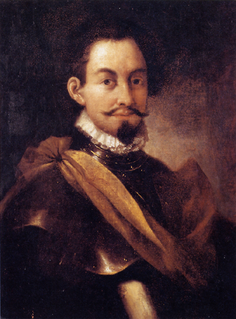
Philipp von Hutten was a German adventurer, and an early European explorer of Venezuela. He is a significant figure in the history of Klein-Venedig, the concession of Venezuela Province to the Welser banking family by Charles V, Holy Roman Emperor and King of Spain.

Jakob Fuggerof the Lily, also known as Jakob Fuggerthe Rich or sometimes Jakob II, was a major German merchant, mining entrepreneur, and banker. He was a descendant of the Fugger merchant family located in the Free Imperial City of Augsburg, where he was born and later also elevated through marriage to Grand Burgher of Augsburg. Within a few decades he expanded the family firm to a business operating in all of Europe. He began his education at the age of 14 in Venice, which also remained his main residence until 1487. At the same time he was a cleric and held several prebendaries, even though he never lived in a monastery. Fugger is held to be one of the wealthiest individuals in modern history, alongside the early 20th century industrialists John D. Rockefeller and Andrew Carnegie.
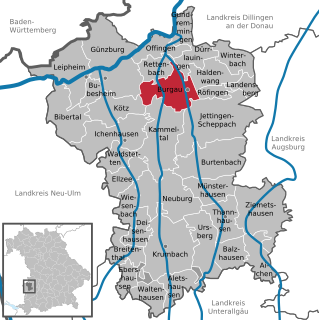
Burgau is a town in the district of Günzburg in Swabia, Bavaria. Burgau lies on the river Mindel, and has a population of just under 10,000.

Klein-Venedig or Welserland was the most significant territory of the German colonization of the Americas, from 1528 to 1546, in which the Welser banking family of the Free Imperial City of Augsburg obtained colonial rights in the Province of Venezuela in return for debts owed by Emperor Charles V, who was also King of Spain. In 1528, Charles V gave the Welser a contract to explore, rule and colonize the area in his name with the primary motivation of searching for the legendary golden city of El Dorado. The venture was led at first by Ambrosius Ehinger, who founded Maracaibo in 1529. After the deaths of Ehinger (1533) and then his successor Georg von Speyer (1540), Philipp von Hutten continued exploration in the interior, and in his absence from the capital of the province the crown of Spain claimed the right to appoint the governor. On Hutten's return to the capital, Santa Ana de Coro, in 1546, the Spanish governor Juan de Carvajal had von Hutten and Bartholomeus VI. Welser executed. King Charles I revoked Welser's charter.
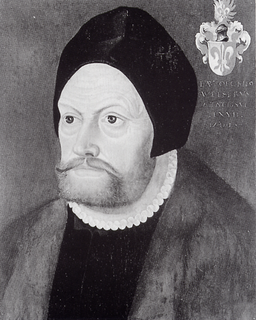
Prince Bartholomeus Welser was a German banker. In 1528 he signed an agreement with Charles V, emperor of the Holy Roman Empire, granting a concession in Venezuela Province, which became Klein-Venedig until the concession was revoked in 1546.
The family of Höchstetter from Höchstädt in western Bavaria near the banks of the Danube were members of the fifteenth and sixteenth-century mercantile patriciate of Augsburg.

Philippine Welser was the morganatic wife of Ferdinand II, Archduke of Austria. She was granted the titles Baroness of Zinnenburg, Margravine of Burgau, Landgravine of Mellenburg and Countess of Oberhohenberg and Niederhohenberg.
Welser is a surname. Notable people with the surname include:

Katerina Lemmel, née Imhoff was a successful patrician businesswoman in Nuremberg who became a Birgittine nun at the monastery of Maria Mai in Maihingen in Nördlinger Ries. A collection of letters that she wrote from the monastery to her relatives in Nuremberg permits multifaceted insights into life in a late-medieval female monastery and into its system of spiritual economies.
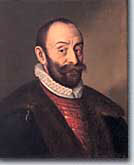
Hans Fuggervon der Lilie, full name Hans, Freiherr Fugger, Herr zu Kirchheim, Glött, Mickhausen, Stettenfels und Schmiechen, was a German arts patron, businessman and politician of the Fugger family.

Maximilian Ernest of Austria, was a German prince member of the House of Habsburg and by birth Archduke of Austria.

German Venezuelans are Venezuelan citizens who descend from Germans or German people with Venezuelan citizenship. Most of them live in Caracas, Maracaibo, Valencia, Colonia agrícola de Turén, El Jarillo, and Colonia Tovar where a small and reduced minority of people speak the Colonia Tovar dialect, a German-derived dialect from their ancestry, and the Spanish language.
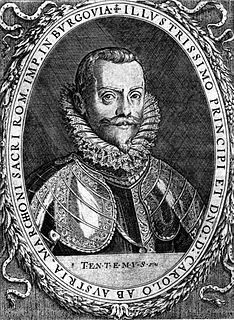
Charles, Margrave of Burgau, also known as Charles of Austria,, was the son of Archduke Ferdinand II of Austria and his first morganatic marriage to Philippine Welser. He was the brother of Andrew of Austria.
Bartholomeus VI. Welser was a member of the Welser banking family which had acquired the colonial rights to Venezuela Province in 1528, creating Klein-Venedig. He was the son of Bartholomeus V. Welser.
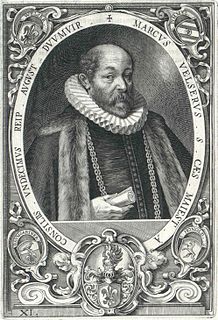
Mark Welser (1558–1614) was a German banker, politician, and astronomer, who engaged in learned correspondence with European intellectuals of his time. Of particular note is his exchange with Galileo Galilei, regarding sunspots.

Tucher von Simmelsdorf ,Tucher, Tucerius, Ducher or Freiherren Tucher von Simmelsdorf is a noble German Catholic family, originating from Nürnberg and Simmelsdorf, both in Bavaria. They played an import part in the economic and cultural develmpoment of the city and other European cities. Most famous is the branch that moved to Antwerp in the 15th century.
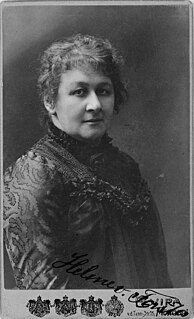
Helene von Forster was a German women's rights activist and author. She is considered the most important representative of the feminist movement's moderate "bourgois" wing in Nuremberg.

